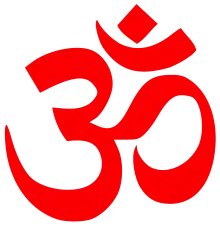Jagadguru
Jagadguru, literally meaning the guru of the universe, is a title used in Sanātana Dharma. Traditionally, it has been bestowed upon or used for ācāryas belonging to the Vedānta school (among the six traditional schools of thought in Hinduism) who have written Sanskrit commentaries on the Prasthānatrayī (literally, 'the three sources') – the Brahma sūtras (the original scripture of Vedānta), the Bhagavad-gītā (part of the Mahābhārata) and the principal Upaniṣads. Historically, jagadgurus have established a lineage (paramparā), established an institution to spread dharma, who have been based in Varanasi, the centre of Sanskrit study.
| Part of a series on | |
| Hindu philosophy | |
|---|---|
 | |
| Orthodox | |
|
|
|
| Heterodox | |
|
|
|
Origin and history of the term
Jagadguru is of Sanskrit origin where jagat means 'the entire world' and guru means 'spiritual master' (literally, 'dispeller of darkness'). In the classics and scriptures, the word has been used for several Devas. In the Mahābhārata, Arjuna addresses Śrī Kṛṣṇa as the 'Supreme Master of the entire world'. Jagadguru Śrīpāda Ādi Śaṅkarācārya uses the title Jagadguru for Śrī Kṛṣṇa in his Śrī Kṛṣṇa-āṣṭakam.[1] The Sanskrit poet Kālidāsa uses the word Jagadguru for Lord Śiva in his great poem (Mahā-kāvya) titled Kumārasambhava.[2] In the Rāmacaritamānasa, the poet-saint Tulasidāsa uses the same word for Lord Rāma.[3] Bhaktisiddhānta Sarasvatī Prabhupāda uses it for Śrī Caitanya Mahāprabhu in his song Guru Paramparā.[4] A. C. Bhaktivedānta Svāmi Prabhupāda uses it for Lord Kṛṣṇa in his composition Mārkine Bhāgavata-Dharma.[5]
Traditional Jagadgurus
- Śrīpāda Śaṅkarācārya (c. 788 – c. 820) (also known as "Ādi Śaṅkara" or Śaṅkara Bhagavatpāda, founder of Advaita school of Vedānta.[6]
- Śrīpāda Rāmānujācārya (c.1017 – c.1137), founder of Viśiṣṭādvaita school of Vedānta.[6]
- Śrīpāda Madhvācārya (c. 1239 – c. 1319) (also known as "Pūrna Prajña" or "Ānanda Tīrtha Bhagavatpāda", founder of the Dvaita school of Vedānta.[6]
- Śrī Nimbārkācārya, founder of Dvaitadvaita school of Vedānta.[6]
- Śrī Vallabhācārya (c.1479 – c.1531), founder of Shuddhadvaita school of Vedānta
Jagadguru as Title
Traditionally the title Jagadguru is used by Shankaracharya's, and all the peetadhipathis of Mathas founded by traditional Jagadgurus such as Adi Shankara, Ramanuja, Madhvacharya, Nimbarka and Vallabha.
Jagadguru is also honoured as the title by Kashi Vidvat Parishat in Varanasi for the knowledge and value of particular guru. The title "Jagadguru Ramanandacharya" is used in the lineage of Ramananda, founder of Ramanandi Sampradaya.[7]
- Kripalu Maharaj (c. 1922 - c. 2013), founder of Jagadguru Kripalu Parishad, a Hindu non-profit organization preaching Bhakti yoga.[8] He was honoured with the title Jagadguru by Kashi Vidvat Parisat on 14 January 1957.[9]
- Rambhadracharya (born 14 January 1950), founder of Tulsi Peeth following Ramanandi Sampradaya. He was conferred the title Jagadguru Ramanandacharya by Kashi Vidvat Parishat on 24 June 1988.[10]
References
- Shankaracharya, Adi. "Shri Krishna-ashtakam". Krsna Kirtana Songs. Retrieved 5 September 2016.
- Kumārasambhava, Canto 6, Verse 15 and also Canto 8, verse 24.
- Rāmacaritamānasa, Āraṇya Kāṇḍa, verse 3.9.
- Sarasvati, Bhaktisiddhanta. "Guru Parampara". Krsna Kirtana Songs. Retrieved 20 April 2016.
- Bhaktivedanta Swami, A. C. "Markine Bhagavata-Dharma". Krsna Kirtana Songs. Retrieved 17 April 2016.
- Saraswati, Prakashanand (2007). The True History and Religion Of India: A Concise Encyclopedia of Authentic Hinduism (First ed.). New Delhi: Macmillan Publishers. ISBN 978-0230630659. Retrieved 28 April 2016.
- Palmisano & Pannofino 2017, p. 79.
- "51st coronation year of 5th Original JagadGuru". Retrieved 23 August 2020.
- "Kirti Mandir in Barsana Opens in a Grand and Historical Opening Ceremony". Business Standard India. Press Trust of India. 2019-02-11. Retrieved 2020-06-03.
- Dinkar 2008, p. 32.
Bibliography
- Dinkar, Dr. Vagish (2008). श्रीभार्गवराघवीयम् मीमांसा [Investigation into Śrībhārgavarāghavīyam] (in Hindi). Delhi, India: Deshbharti Prakashan. ISBN 978-81-908276-6-9.
- Palmisano, Stefania; Pannofino, Nicola (2017). Invention of Tradition and Syncretism in Contemporary Religions: Sacred Creativity. Springer. ISBN 9783319610979.CS1 maint: ref=harv (link)
